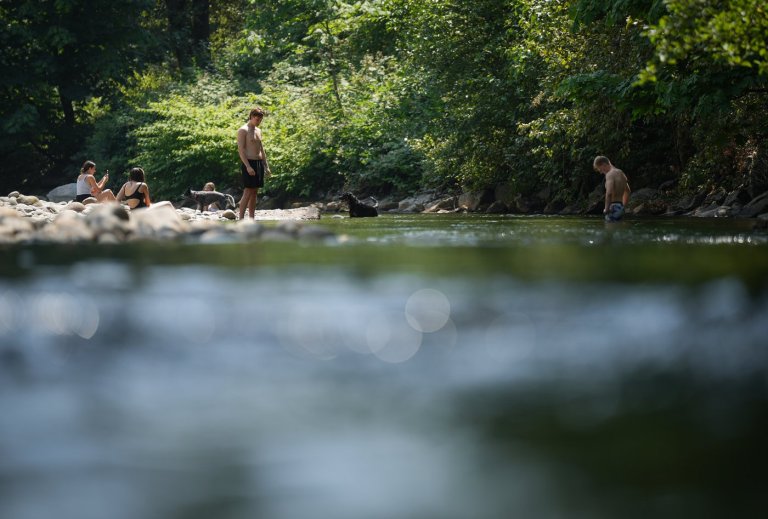Editorial Roundup: Pennsylvania
Recent editorials of statewide and national interest from Pennsylvania’s newspapers:
Expand the safety arsenal to curb violence
The Citizens’ Voice
July 10
Gun shops are among the few businesses that have thrived amid the COVID-19 public health emergency, all the more so since the Wolf administration classified them as “essential” businesses exempt from state-enforced closure.
According to a state police report issued Wednesday, the agency conducted 314,319 background checks on gun purchasers during April, May and June, up from 217,444 during the same period in 2019, a 45% increase.
The experience demonstrates that the background checks are a valuable safety tool that does not impinge on anyone’s right to own a firearm — legally.
According to the report, 5,801 people were flagged by background checks during the period and precluded from obtaining weapons or concealed carry licenses. Of those cases, 1,238 of the denials were referred to local, state or federal police agencies for further investigation, and 83 people immediately were arrested for attempting to buy one or more weapons while having a criminal warrants pending against them.
Despite that repeated proof that many people who are precluded by law from having weapons attempt to buy them, state lawmakers continue to stonewall reasonable proposals to expand the background check system to venues not now covered by the law, including gun shows, person-to-person transactions and some internet sales. Likewise, the checks should be expanded to include all types of guns.
Definitions in the law should be changed to include so-called “ghost guns,” which do not require background checks because buyers themselves assemble the weapons.
Gun violence in Philadelphia has spiked amid the emergency. Lawmakers should help to thwart it with the expanded background checks, requiring gun owners to report lost or stolen weapons to police and limiting gun sales to one per person per month. Doing so would help reduce “straw purchases” and illegal sales that supply criminals with deadly weapons.
Public safety is in the interest of gun owners as much as anyone else. Lawmakers should expand the safety arsenal.
Online: https://bit.ly/2CCXWuZ
___
Parents — not politicians — should decide if their children return to school during a pandemic
Harrisburg Patriot News / Pennlive.com
July 10
If a little girl walks into a classroom this fall, it should be her choice. Or at least her parent’s choice. If she is going to be exposed to a potentially deadly virus, it should not be forced upon the family by any government official. That’s the essence of personal freedom.
Here are some reasonable assumptions:
– The coronavirus will be on a school bus. At least one child will have it.
– The coronavirus will be in a classroom. At least one child will have it.
– The coronavirus will be on the playground when the masks fall off. At least one child will get it.
The decision to expose children to such risks should rest solely with their parents. And the last thing they need is to be mandated to send their kids into a pandemic plagued world against their wishes.
President Donald Trump is threatening to cut off federal funding to states that don’t fully reopen schools in the fall. That is a mistake. It contradicts the fundamental principles of American freedom. If you can argue wearing a mask infringes on personal freedom, what about forcing parents to potentially expose their children to disease and death?
If Pennsylvania schools even partially reopen in the fall for in-classroom learning, they will need all the funding they can get to clean, disinfect, purchase masks and PPEs for teachers and staff and ensure medical help is readily available if a child gets sick.
It could all be an empty threat, as Congress controls funding, but the underlying issue involves protecting children, as well as their parents, teachers and the vulnerable janitors, cafeteria workers, secretaries and school crossing guards that serve them.
And the underlying issue involves who has the right to risk a child’s life.
Schools can reopen in the fall with all the promises of social distancing and safety administrators can muster. But some parents will not trust such guarantees, and that’s understandable. They know kids. They know they will remove their masks, get too close, sneeze into their hands, touch the eraser, or just cough into the air. Many also can’t keep their hands out of their noses.
Parents know this. So, let them decide if they want to take the risk. Those who want to send their kids into the classroom can do so, if a modicum of safety is possible. But parents who don’t want to send their children into the classroom should be able to keep their kids at home.
It’s as simple as that.
Gov. Tom Wolf should not be pressured into forcing schools in Pennsylvania to reopen if the coronavirus numbers keep rising and if it will endanger the lives of thousands of teachers and staff, not to mention children.
We’re already seeing rising numbers of young adults hospitalized with the coronavirus. We don’t want to see the same with school-aged children. The president says their immune systems are strong and they can withstand the virus. But that’s overlooking the thousands of children with underlying or undetected health conditions that put them at risk for serious illness or death if they contract the coronavirus. And it’s overlooking the medical fact that children will bring the virus home.
Forcing children to return to school during a raging pandemic could lead to more sickness and death. Sick teachers can’t teach. Sick children can’t learn. And sick parents can’t work and make sure their children even get to school if it’s open.
Let’s face the facts. As much as we want things to get back to normal, nothing can be normal while this virus spreads. Just ask the doctors and nurses who are trying to save lives every day. And ask the families of the more than 130,000 Americans who already have died.
Online: https://bit.ly/2CCZ3uF
___
State must take fresh look at fireworks law
Reading Eagle
July 12
Last weekend’s noisy Fourth of July celebrations left plenty of Pennsylvanians in a less than festive mood. In many neighbourhoods the fireworks started long before July 4 and have yet to stop.
Anecdotal evidence strongly suggests that this has been one of the worst years in terms of noise complaints related to fireworks. The problems start while it’s still daylight and continue well past midnight.
There are two factors at work here. The first is that the coronavirus pandemic eliminated many of the usual holiday activities, including professional fireworks displays. It’s no wonder many people decided to provide entertainment of their own at home.
The other factor is that Pennsylvanians have access to more powerful pyrotechnics than they once did. Thanks to a 2017 change in state law, it’s legal to buy fireworks such as Roman candles, firecrackers, bottle rockets and other items that previously were banned. For decades the only such material allowed in Pennsylvania were those that stay close to the ground, such as sparklers.
The last couple of summers were noisier than ever and produced plenty of complaints along with near-disasters such as a Reading elementary school that caught fire due to fireworks. Early reports from officials indicated that this year’s Independence Day was far worse.
“This July Fourth seems much worse than previous ones,” Berks County Emergency Services Director Brian Gottschall said, noting that dispatchers received 238 noise complaints between 7 p.m. and 1 a.m. “It’s always a busy night, but it seemed different than those in the past.”
Complaints were recorded all over, from urban areas to the suburbs, and in rural communities. The danger and annoyance associated with fireworks have people concerned all over Pennsylvania.
State lawmakers were hearing the call even before July 4 arrived. The Senate voted 48-2 on an amendment to a Senate bill that would give officials in Philadelphia, Pittsburgh, Scranton, Allentown, Erie, Reading, Bethlehem, Lancaster and Bensalem Township the option of banning the use of commercial fireworks within their borders.
State Sen. Judy Schwank, a Berks County Democrat who has been focused on this issue for quite some time, is looking to take it a step further. She’s announced plans to introduce legislation that would scrap the 2017 Fireworks Act. That would once again limit Pennsylvanians to the mildest of pyrotechnic products. State Rep. Mark Rozzi of Berks County and state Sen. Andy Dinniman of Chester County, both Democrats, say they support her effort.
“The ongoing and near-constant use of powerful fireworks in a disrespectful and downright careless manner has become a more than a nuisance — it’s a danger,” Dinniman said in his announcement of support for Schwank’s bill. “The intense noise, light and smoke have a negative impact on senior citizens, young children, veterans, those with special needs, those suffering from post-traumatic stress disorder, and pets and animals.”
We agree. It’s most unfortunate that so many people have abused the privilege of having access to stronger fireworks. Loosening the fireworks law could have worked had Pennsylvanians been more responsible. That means using them in areas far from structures and not setting off explosions for hours at a time, day after day and at all hours of the night.
However, Schwank and her allies on the issue acknowledge that scrapping the fireworks law will be a tough sell in Harrisburg. The original measure was intended to raise revenue for the state, and it does. Taking away a revenue source is always unpopular among lawmakers. That’s especially true in today’s fiscal situation.
We’d also support any measure that gives local authorities more power to deal with the problem. But as long as powerful fireworks are readily available, enforcement is going to be a challenge. Lawmakers need to figure this out before we endure yet another noisy summer.
Online: https://bit.ly/2Zv88OR
___
You may need to quarantine after your beach vacation. Please consider whether it’s worth it.
LNP
July 15
As of Tuesday afternoon, Lancaster County had 4,876 confirmed COVID-19 cases, according to the Pennsylvania Department of Health, and 367 total deaths, according to county Coroner Dr. Stephen Diamantoni. The commonwealth had 96,671 total cases of COVID-19 and 6,931 deaths. According to the Johns Hopkins Coronavirus Resource Center, the U.S. has surpassed the 136,000 death threshold.
Gov. Tom Wolf has been castigated as a “dictator” by some critics of the strict measures he imposed to contain the spread of the novel coronavirus in Pennsylvania.
But for a purported dictator, he’s being pretty lax about the 14-day quarantine his health officials recommend for Pennsylvania residents who visit certain other states.
Over the weekend, state health officials said Pennsylvanians who travel to Delaware, Iowa, Kansas and Oklahoma are advised to “stay home for 14 days upon return to Pennsylvania” — that is, to self-quarantine. (Delaware was removed from the list Wednesday, just days after it was added.)
Those states were added to 15 others announced earlier: Alabama, Arizona, Arkansas, California, Florida, Georgia, Idaho, Louisiana, Mississippi, Nevada, North Carolina, South Carolina, Tennessee, Texas and Utah.
We sincerely hope Lancaster County residents aren’t visiting Florida, which is now the epicenter of the U.S. COVID-19 crisis.
As the Orlando Sentinel reported, “Florida shattered the national record Sunday for the largest single-day increase in cases in any state since the beginning of the pandemic, adding over 15,000 cases as its daily average death toll continued to also rise.”
Orlando, of course, is the home of Disney World, which for some inexplicable reason, partially reopened its doors Saturday. You couldn’t buy enough hand sanitizer to get us to ride the Space Mountain roller coaster right now.
That said, we feel for families who had planned to take their children there this summer. It’s a destination that some wait years to visit, saving money and making meticulous plans.
We also feel for those who hoped to vacation at the beautiful Outer Banks in North Carolina or Myrtle Beach or Hilton Head in South Carolina.
For some families, we’re sure, the cost of vacation — plus the cost of taking unpaid time off to quarantine — would be too high.
That reality is going to work against the effectiveness of the Wolf administration’s recommendation, which relies on the honour system.
As Maggi Mumma, deputy press secretary for the state Department of Health, told us in an emailed statement this week, “At this time, quarantine related to travel is a recommendation, not a requirement. Quarantine is recommended because it is one of the most effective methods in preventing the spread of COVID-19.”
She noted that “voluntary compliance is the key to successful implementation. Using techniques such as wearing face masks, social distancing, and quarantining after travel to the listed states limits the spread of COVID-19 for the benefit of family, friends, and fellow Pennsylvanians. Therefore, it is in everyone’s best interest that all Pennsylvanians comply with this recommendation.”
We agree with all of that, but we’re a bit skeptical that people will heed the recommendation, and not just because of its potential impracticalities.
People are understandably weary of COVID-19 — though that weariness doesn’t mean the danger is anywhere near over.
Robert Redfield, director of the Centers for Disease Control and Prevention, said this during an online Journal of the American Medical Association discussion Tuesday: “I do think the fall and the winter of 2020 and 2021 are going to be probably one of the most difficult times that we’ve experienced in American public health because of … the co-occurrence of COVID and influenza.”
That’s distressing, to put it mildly, because we’ve already been through pretty difficult times.
But Redfield also said this, according to the website Axios: “If we could get everybody to wear a mask right now, I think in four, six, eight weeks we could bring this epidemic under control.”
An editorial co-authored by Redfield, and published in the Journal of the American Medical Association on Tuesday, stated: “Like herd immunity with vaccines, the more individuals wear cloth face coverings in public places where they may be close together, the more the entire community is protected.”
And community-level protection “can reduce the number of new infections and facilitate cautious easing of more societally disruptive community interventions such as stay-at-home orders and business closings.”
Until there’s a reliable and accessible vaccine — and, encouragingly, it was reported Tuesday that one vaccine being tested had triggered an immune response in those who received it — preventive measures are our best hope.
Face coverings now are required when we leave our homes in Pennsylvania, and yet, maddeningly, some people still balk at wearing them.
One writer of a letter to the editor noted the “lack of empathy” of people who “pompously stride into a convenience store … maskless, blatantly ignoring the obvious posted signs stating that facial coverings are required for entry.”
Another wrote of being in “a locally owned market where about half of the customers were not wearing masks. The manager just shrugged and said he assumed they were medically compromised, adding he also felt mask-wearing was a personal choice.”
Given the resistance to masks, which are required, why would Pennsylvanians voluntarily self-isolate for 14 days after a vacation?
This, we hope, is why: Because we care about the well-being of others — and are keenly aware of the dangers of COVID-19. Because we want our kids to be able to return to the classroom next month. Because we don’t want bars and restaurants to be shut down again, and we don’t want business owners and their employees to lose their livelihoods. Because we want family members to be able to visit their loved ones in nursing homes. Because we want sooner rather than later to be able to work, play, gather, celebrate and pray together in safety — in other words, to exercise the freedoms that those who scorn health recommendations claim to be exercising.
Because, most of all, the novel coronavirus would be a horrible souvenir to bring back from vacation, and we dread the possibility of passing it on to anyone else.
Self-quarantining for 14 days would be a huge sacrifice, we know. If you can’t afford to take that much time off, you probably shouldn’t vacation in any of the states on the commonwealth’s list. Which may seem unfair, but that’s the reality. Because it may not just be you who will have to pay for the risks you take.
Online: https://bit.ly/2DLBQHa
___
Now is the time to fix vote-by-mail
Pittsburgh Post-Gazette
July 9
President Donald Trump’s re-election campaign is suing Pennsylvania to force changes in how the state collects and counts mail-in ballots. The lawsuit raises some concerns worthy of review, but the lawsuit should not intimidate officials against moving forward with an even more robust mail-in voting process.
The Trump campaign maintains that mail-in voting procedures were accompanied by illegal changes, including allowing voters to drop off completed ballots at collection sites outside of county elections offices such as community college campuses, fairgrounds, retirement homes and parks. This is a more than fair point. We cannot go to such lengths to make voting “convenient” that we compromise the franchise.
The campaign is also demanding security envelopes for ballots and poll watchers who monitor collection sites.
Democratic leaders view the lawsuit as a strategy to further paint mail-in voting as inherently fraudulent, but that doesn’t address the substantive problems that have become evident.
The issues raised in the lawsuit should be reviewed to ensure the integrity of the election, but state officials should also make use of the time before the November presidential election to better prepare for what will likely be a huge number of requests for mail-in ballots
The primary election was the first in which voters could opt for a mail-in ballot with no restrictions, and the option proved extremely popular. Out of the 2.8 million votes cast, more than 1.4 million came by way of mail-in ballots.
Still, there were issues. Many county offices were overwhelmed by both the number of requests and the time needed to count them. Some took more than a week to complete the counting process. Some voters received the wrong ballot; others never received one at all, despite completing the application process.
Multiple voting rights groups in the state have called on Pennsylvania to address these concerns before the presidential election in November.
Groups supporting mail-in voting, like Common Cause and Make the Road PA, are pushing for the mailing of a ballot to every registered voter, rather than making them apply for one. Advocates are also calling for mail-in ballots to be counted as they are sent in, rather than forcing officials to wait until Election Day to begin the count.
Such practices are already the norm in several other states. Colorado, which recently set a record for primary turnout in its state, employs a “universal” vote-by-mail system, where all registered voters receive a ballot. Voters can mail their ballots in or drop them off at designated voting centres, and the majority choose to do so instead of voting in person. Ballots are counted as they are received.
Pennsylvania needs to catch up. It’s evident that mail-in ballots will be a popular and necessary option for state voters this fall. Lawmakers must listen to their constituents and learn from best practices of other states.
Online: https://bit.ly/32nbntQ
___
Join the Conversation!
Want to share your thoughts, add context, or connect with others in your community?
You must be logged in to post a comment.


















